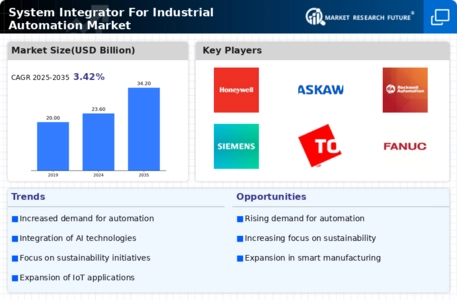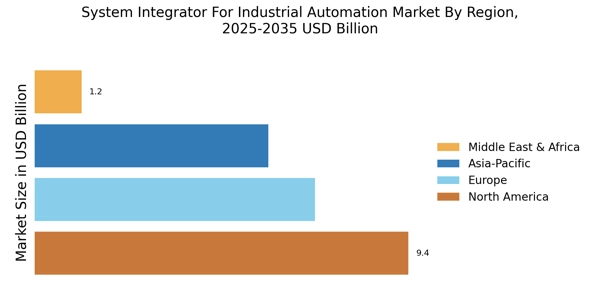Rising Adoption of Automation Technologies
The System Integrator For Industrial Automation Market is experiencing a notable surge in the adoption of automation technologies across various sectors. Industries are increasingly recognizing the potential of automation to enhance operational efficiency, reduce labor costs, and improve product quality. According to recent data, the automation market is projected to grow at a compound annual growth rate of approximately 9% over the next five years. This trend is driven by the need for manufacturers to remain competitive in a rapidly evolving landscape, where precision and speed are paramount. As a result, system integrators are becoming essential partners in implementing these technologies, ensuring seamless integration and functionality within existing systems.
Emphasis on Safety and Compliance Standards
The System Integrator For Industrial Automation Market is significantly influenced by the increasing emphasis on safety and compliance standards. As industries face stringent regulations regarding workplace safety and environmental impact, the demand for automation solutions that adhere to these standards is on the rise. System integrators are tasked with designing and implementing systems that not only enhance productivity but also ensure compliance with safety regulations. This focus on safety is particularly evident in sectors such as manufacturing and energy, where the consequences of non-compliance can be severe. Consequently, system integrators are becoming vital in navigating these complexities, providing solutions that meet regulatory requirements while optimizing operational efficiency.
Expansion of Smart Manufacturing Initiatives
The System Integrator For Industrial Automation Market is benefiting from the expansion of smart manufacturing initiatives. As industries increasingly adopt the Internet of Things (IoT) and Industry 4.0 principles, the demand for integrated automation solutions is growing. Smart manufacturing emphasizes connectivity, real-time data exchange, and intelligent decision-making, which necessitates the expertise of system integrators. These professionals are essential in creating interconnected systems that facilitate seamless communication between machines and processes. The market for smart manufacturing is projected to reach substantial figures in the coming years, indicating a robust opportunity for system integrators to provide innovative solutions that align with these initiatives.
Increased Focus on Cost Reduction Strategies
The System Integrator For Industrial Automation Market is witnessing an increased focus on cost reduction strategies among businesses. In a competitive environment, organizations are seeking ways to minimize operational costs while maximizing output. Automation is recognized as a key driver in achieving these objectives, leading to a heightened demand for system integrators who can deliver cost-effective solutions. By implementing automation technologies, companies can streamline processes, reduce waste, and enhance overall efficiency. This trend is expected to continue, with many industries prioritizing investments in automation as a means to achieve sustainable cost savings and improve their bottom line.
Growing Demand for Data-Driven Decision Making
In the current landscape, the System Integrator For Industrial Automation Market is witnessing a growing demand for data-driven decision-making processes. Organizations are increasingly leveraging data analytics and real-time monitoring to optimize their operations. This shift is indicative of a broader trend where companies seek to harness the power of data to enhance productivity and reduce downtime. The integration of advanced data analytics tools into automation systems allows for predictive maintenance and improved operational insights. As a result, system integrators play a crucial role in facilitating this transition, ensuring that automation solutions are equipped with the necessary data capabilities to support informed decision-making.

















